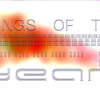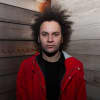Whenever I interact with experimental music that's "crossed over" from dingy warehouse spaces to museums or planetariums or zoos or really just places that feel more traditionally welcoming than, say, a building corroded with rust behind a barbed wire fence next to an abandoned factory, I always think of a piece that Nick Sylvester wrote a couple years ago about Black Dice. What the piece is actually about—besides the inherent coolness of Black Dice's musical experiments—is finding romance in a shared love of weird shit, and how it's rare enough that it's worth holding onto, or at least thinking about a lot.
Tyondai Braxton, the son of avant-garde composer Anthony Braxton and former member of the super technical and mathy Battles, doesn't exactly come from the world I outlined above. His music is certainly niche. Even in Battles, who looked like a rock band but sounded like a series of complex machines all working at once, he enjoyed much wider success than you'd expect. That, combined with his serious technical prowess and high-concept ideas that blend visual and musical elements into a mass of pulsing percussion-based experiments, amounts to an interesting career that last night brought him to The Guggenheim to debut his new project, HIVE, as part of the city's Worldless Music series. The performance involved four other musicians—Ben Vida, Yuri Yamashita, Jared Soldiviero and John Ostrowski—each sitting cross-legged on raised platforms designed by Uffe Surland Van Tams, fiddling with modular synths and various percussion instruments, large and small. It started out noisy and confusing, but by the end had turned into a glorious exploration of the power of hypnotic rhythm.
Crowds at museum shows are always kind of weird—at least in New York. It's a blend of the older art community and avant-garde music fans. At points, looking around the audience, I got the impression they were absorbing what Braxton was doing as something to be studied, rather than danced to. This isn't wrong in any way, which is partially why HIVE was such an interesting experience. Braxton is creating experimental compositions that could fit into any concert hall in the world, but they also feel very steeped in modern music. Not pop music necessarily—but the trails are there. I think it's the heavy emphasis on percussion that moves it away from a modern classical take on drone and into the realm of music meant to be felt, rather than looked at.
At the Guggenheim, you could watch Braxton play from just about every angle. You could look at him straight on, or you could look down at the players from above. Because of the sheer height of the room, the sounds they were making would vary depending on where you're standing. From up above, it felt more reserved, but standing in front of Braxton and company was a visceral, jagged experience. There's some commentary to be made here about how where you stood during the performance probably says something about your listening habits or age or something, but as the piece grew and shifted and took on a life of its own, it became less about what each individual musician was doing and more about the whole. I looked up and saw a couple guys leaning their entire bodies over the wall, heads up at the ceiling, swaying ecstatically. Right next to them was an older couple, standing rigid. Neither felt out of place.
Which brings me back to Sylvester's Black Dice piece and dealing with the fringes of experimental music. When a weird band—like Animal Collective, Black Dice, Butthole Surfers and countless others—makes that jump into public consciousness, it's worth noting when they do so without changing their sound to fit a more palatable mold. Being popular isn't the end goal, just sort of an accidental thing that happens when their vision aligns with a much broader subsection of the public consciousness.
HIVE is, apparently, a work in progress. In a recent interview, Braxton mentions that before last night's performance, the piece existed only in piecemeal form. The pods that the musicians sat on were driven all the way across the country for the show, but it was the group's first time actually seeing them. Maybe we'll never get another performance of HIVE as it existed last night, but it works as a platform for Braxton's future compositions, which will surely continue to blend genres and disparate musical worlds effortlessly, even as the music continues to challenge.


